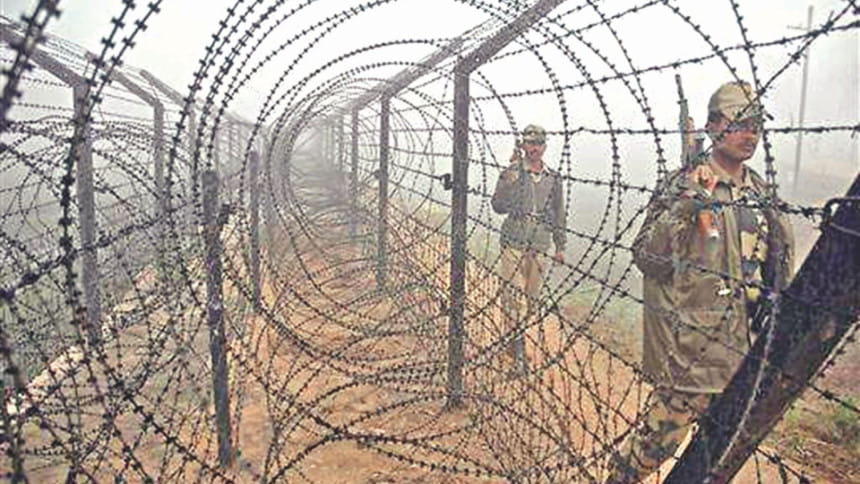Felani, the BSF and the elusive zero target

This week marks the sixth anniversary of the killing of Felani by the Border Security Force (BSF) of India. Felani, a 15-year-old girl, was shot dead by the BSF at a close range while crossing the 2.5 metre high barbed wire fence in the early hours of January 7, 2011. Little Felani's red and purple dress got entangled with the fence when she was following her father who barely managed to get across. No warning was given to unarmed Felani. Her body was kept hanging in full public view for about five hours. Villagers claimed she cried out for water and help, but no one dared to come close. Slowly, Felani bled to death. After 30 hours, her body was returned with hands and feet tied to a bamboo pole.
Amidst huge outcry in Bangladesh, charges were finally laid against Amiya Ghosh, the BSF jawan. The Special BSF Court tried Ghosh. But it exonerated him on September 6, 2013 on the grounds that evidence was 'inconclusive and insufficient'. A retrial on appeal produced the same result. Felani's father termed the BSF Court's decision as "mockery of justice".
Outraged at the BSF court's verdict, a Kolkata based human rights organisation Manabadhikar Shurokkha Mancha (MASUM) moved the National Human Rights Commission in India for compensation. The commission directed the Indian government to pay half a million Indian rupees as compensation to Felani's family as the commission "was satisfied that there could be no justification for shooting at an unarmed girl". The NHRC turned down the Indian Home Ministry's plea to keep in abeyance the issue of compensation. The family of Felani is yet to receive the compensation money.
Exactly six years later, on January 7 this year, on the anniversary of Felani's killing, the BSF beat to death Mohammad Bakuluddin (25) of Chuadanga. Bokul and his associates were returning after collecting cattle from India. The group was chased by a BSF patrol. While others managed to escape, Bokul was apprehended by the border agency. Later, he was dropped on the Bangladeshi side of the border and died on his way to a medical facility. Marks of torture were evident on his body. The local Union Parishad member alleged that Bokul's hands and feet were beaten with rod and his face was poked with bayonets (Prothom Alo, January 8, 2017).
The barbed wire fence, built by India, presumably taking cue from what Israel set up in West Bank, has not been very effective in deterring residents along the border, who, from time immemorial, regularly move across the border for livelihood, social, medical and a host of other reasons. It has been much less effective for those who are engaged in lucrative cattle trading. An overwhelming number of those who get killed are either farmers working in the fields in close vicinity of the border or cattle traders. Torture of those apprehended by the BSF and abduction of border residents have also been alleged.
For pursuing the shoot-to-kill policy of unarmed civilians, the Human Rights Watch (HRW) has accused the BSF of turning the border areas into "South Asian killing fields". It notes with grave concern the endorsement of these acts by some Indian officials on the grounds that the victims were attempting to cross the border illegally, even if they were unarmed. In the not-so-recent past, Raman Srivastava, the former head of BSF, was reported to have observed that since these individuals were illegally entering Indian territory, often at night, they were "not innocent" and therefore legitimate targets. It is this mindset that makes the BSF the judge, jury and executioner undermining the functional penal system that India is so proud of.
HRW also criticised foreign governments for not condemning what it terms "killings…in cold blood" of "unarmed and defenceless local residents". In no uncertain terms, the organisation noted: "India has the right to impose border controls. But India does not have the right to use lethal force except where strictly necessary to protect life".
Within months of Felani's murder, Mr. P. Chidambaram, then Home Minister of India, expressed deep regret on the matter during a visit to Dhaka. He declared that the BSF would no longer shoot any civilian under any circumstances, and that the agency would only use non-lethal weapons. Bangladesh's Home Minister subsequently echoed his position when he explained that rubber bullets and sound grenades would replace live ammunition. The Bangladesh Minister further informed the lawmakers that at a meeting of the Director Generals of BSF and Bangladesh Border Guards, both sides agreed to bring down the number of border killings "to zero".
Despite such lofty commitments and their reiterations, killings, abduction and torture have become integral features of the border management strategy of India. Ain O Salish Kendra reports that in the last five years (2012-2016) 188 Bangladeshis were killed at the border by the BSF. According to news reports, on April 24, 2016, the Home Minister of Bangladesh informed the Parliament that 146 Bangladeshis were killed along the borders by the BSF during the preceding four-year period.
The 4,000 km long Indo-Bangladesh border is perhaps one of the most volatile peacetime borders of the world. Successive governments in India have failed to live up to their commitments in bringing down border killings of unarmed civilians to zero. The BSF ought to respect the sentiments of Bangladeshis by establishing accountability. Felani's death anniversary is a stark reminder to all concerned, particularly the Indian political leadership, that good neighbourliness demands a total halt to such dastardly acts by its border security agency.
The writer teaches International Relations at the University of Dhaka.

 For all latest news, follow The Daily Star's Google News channel.
For all latest news, follow The Daily Star's Google News channel. 



Comments